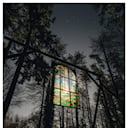By what name were the English textile workers known, who protested against the Industrial Revolution?
The British Industrial Revolution (1750-1850) brought radical changes to factories, such as machinery. Unfortunately, the introduction of machines cost many people their jobs. Factories needed fewer people, thus increasing unemployment. In 1812, a secret organisation called the Luddites protested against the Industrial Revolution, destroying textile machinery in the process. Led by Ned Ludd, a weaver from Leicester, the Luddites met at night on the outskirts of industrial towns to plan their attacks. After entering the town, they smashed machines and sent death threats to factory owners before escaping through secret getaway chambers.
Regarding the Luddite riots, Lord Byron (1788-1824) spoke in the House of Lords, “I have been in some of the most oppressed provinces of Turkey; but never, under the most despotic of infidel governments, did I behold such squalid wretchedness as I have seen since my return, in the very heart of a Christian country.”
The British Army frequently clashed with the Luddites, arresting many participants who faced a mass trial in York in January 1813. Parliament passed the Frame Breaking Act, which made machine sabotage a capital punishment. At least 60 men were found guilty and sentenced to either execution or penal transportation. Fearful of this new law, the Luddite organisation disbanded.
More Info:
en.wikipedia.org



